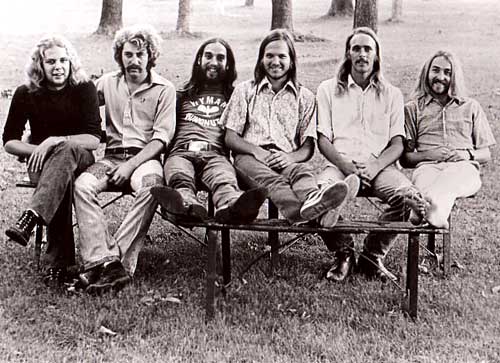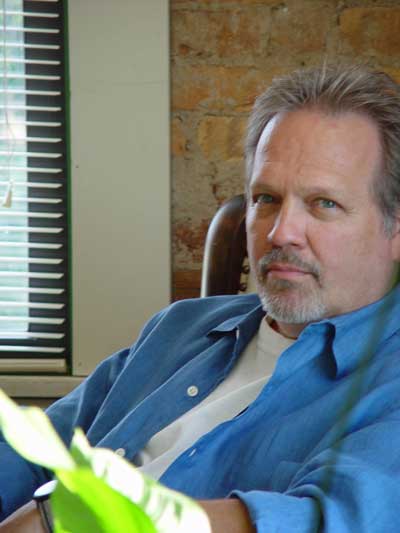OZARK
MOUNTAIN DAREDEVILS' OLD STUNTS ARE NEW AGAIN
By Barry
Gilbert
Of the Post-Dispatch
June 6, 2004
 |
Thirty years ago this spring, "If
You Wanna Get to Heaven" was blasting out of car
radios and starting to climb the charts, adding a
different color to the country-rock palette and making
stars out of six songwriters from Springfield, Mo. But with the exception of some "best
of" packages, the music of the Ozark Mountain
Daredevils has been largely unavailable on CD. In fact,
singer Steve Cash's daughter Star had not heard a lot of
it -- because it wasn't "in her format." And
she's 29. Today, thanks to reissues with bonus tracks and
a recent before-they-were-famous collection called
"The Lost Cabin Sessions," the Missouri band's
music is new again.
"You know," Cash remembers
his daughter saying after hearing "If You Wanna Get
to Heaven," "if you changed the drums to sound
modern, that would be a hit right now."
|
"Heaven," with its long, sinewy
harmonica intro, horns and insistent beat, spent five weeks in
the Top 40 in 1974, peaking at No. 25. A year later, the poppy
"Jackie Blue" was an even bigger hit, reaching No. 3
and spending 12 weeks in the Top 40.
But being hitmakers was never the goal of
guitarists Cash and John Dillon, guitarist/harmonica player
Randle Chowning, drummer/guitarist Larry Lee, keyboard man Buddy
Brayfield and bassist Michael "Supe" Granda. The six
came together as a hippie-era songwriters collaborative to simply
share each other's songs.
"It was only after one or two rehearsals
that we realized we all played enough instruments to have a
band," Dillon says. "It was a real organic beginning,
the way you picture things happening in a perfect world: A group
of people come together to share their work and realize that
everyone has something to offer, and they become a cohesive
thing. It's marvelous."
Cosmic beginning
The Daredevils went from playing gigs around
Kansas City under a different band name every night to signing
with a major label and being flown to England to record with hot
producer Glyn Johns, who had already worked with the Eagles,
Rolling Stones, Eric Clapton, the Who and the Beatles.
| The
Daredevils rise began when Paul Peterson, who operated
Kansas City's Cowtown Ballroom, heard a tape of the
Daredevils. He says, without a shred of
self-consciousness, that it changed his life. "It was one of those experiences, you feel
like your body's metabolism changes. I thought, 'Gee,
this is going to be important,'" says Peterson, who
became the band's manager and today guides the original
lineup's catalog from California.
Peterson, who also managed fellow
Missourians Brewer and Shipley, shopped their demo tapes
with his partner before eventually attracting the
attention of Johns and A&M Records.
That was a long way from their early
days playing local gigs.
"The Rhythm of Joy was the name of
the group when I first met them," Peterson recalls.
It's also the name of an early song that is on the
"Lost Cabin Sessions."
Other band names included Burlap Socks,
Buffalo Chips, and the Emergency Band.
Peterson says Cash came up with the
name that stuck, and it's clearly a product of its time:
Cosmic Corncob and His Amazing Ozark Mountain Daredevils.
We shortened that," Peterson
laughs. "Only a bunch of hippies could come up with
that."
|
 John
Dillon
|
"Lost Cabin" days
"The Lost Cabin Sessions" is a
snapshot of those days.
"The cool thing is that these songs were
recorded without any pressure, or with anybody looking over their
shoulders," Peterson says. "It's a real honest
rendering of the material."
"Sessions" consists of some
"rediscovered" Daredevils tracks, most of which have
never been available, at least in these versions. Some of the
tracks had a brief life on vinyl in the '80s, and some were later
polished and re-recorded after the band had made it.
Dillon's "Keep on Churnin'," for
example, appeared on the band's third effort, "The Car Over
the Lake Album" (1975). The country piano rhythms and fills
of Buddy Brayfield in the demo were unfortunately traded for the
horn sound of "Heaven."
On the other hand, the later version of
Chowning's "Leatherwood," also on the "Car"
album, features much more confident vocals and harmonies.
"The important thing," Peterson says,
"is that this was the original lineup, and that's why the
interest was so strong."
Cash remembers the "Lost Cabin" days
as a time of constant music.
"There was just was a flurry of songs
being written and worked out most all of the time," he says.
"Nothing was out of bounds," from jazzlike pieces
brought in by Lee to R&B-influenced songs.
"I remember we had only so much money, we
had to get things done fast," Cash says. "I mean, when
we first went in to make a demo for Epic (which was rejected), we
had $500 to work with. They expected two songs -- we did
23."
By the time those songs were given to Johns and
A&M, the band had written "golly, 250 songs, just a ton
of songs," Cash says. "We were really just in it for
that. Each one of those songs is precious. We just brought them
out of the blue."
Dillon, who today works with Meridian Creative
Alliance, an advertising agency in Springfield, says of the
"Cabin" tracks: "I was amazed at how naive it
sounded, in a way, and the ambiance seems so innocent. Yet,
because of that, it's really true. So I think that's what this
compilation does: It proves our roots were honest.
"We had no design on becoming famous, we
were just a bunch of artists and poets sharing our work with each
other. So when we became successful (with the "Heaven"
single) and began making our living, it was like a fairy tale to
us."
"Heaven" came together in a
Springfield minute: Cash had the lyrics and brought it to the
group; Dillon had a guitar riff. It took either 10 minutes
(Dillon's recall) or 30 minutes (Cash's) to nail the song.
"We knew we had something, but we were so
naive at the time that we didn't understand the music business at
all," Dillon says. "(Our managers) got really
enthusiastic about it, and, through their efforts, we began to
realize we had a future in the marketplace. But that was a
foreign concept to us."
Then, a year later, the "Shine" album
was released and, Dillon says, "'Jackie Blue' comes out and
is played around the world, but we still resisted the idea of
fame. It was a different world, and we were interested in the
work."
"A wonderful time"
In recent years, the Ozark Mountain Daredevils
have played limited dates -- mostly festivals during the summer
-- with a lineup that included only Cash, Dillon and Granda from
the original band. Today, even that lineup is inactive.
So it's ironic that "The Lost Cabin
Sessions" and the reissues are coming out now when, as Cash
says, "we can't capitalize on it. (But) we were kind of
winding down after 30 years on the road. We might play again for
fun, or money, but it has to be a good thing. We're not just
gonna go play on a regular basis anymore."
Cash is launching a new career as a novelist
and reveling in being a grandfather -- his son Cody and
daughter-in-law Allison are about to have their second child.
"I baby-sit (for Chloe) three times a
week," he says. "It's my favorite time of the
week."
His adventure-fantasy novel "The Meq"
has been published in the U.K., and he recently made a deal with
DelRay/Random House for a series of three books, the first
scheduled for April.
It will have elements of fantasy but, Cash
says, will be based in 1881 -- in St. Louis.
"Supe" Granda relocated several years
ago to Nashville, Tenn., where he writes songs and records music
for his Missouri Mule label. He is a frequent performer in St.
Louis as Supe du Jour or with Supe and the Sandwiches.
Randle Chowning and Larry Lee are also in
Nashville, and both are still active in the music business. And
Buddy Brayfield is a doctor in the Ozarks.
But 30 years ago, Cosmic Corncob and his
Amazing Ozark Mountain Daredevils were making a few bucks a night
to support their songwriting habit.
"It was wonderful, it was the most
creative experience in my life spent with other people,"
Cash says. "There's not much to show for it monetarily, but
that's not the point. It was a wonderful time to be in your
20s."
CDs
in print by the Ozark Mountain Daredevils:
"The
Lost Cabin Sessions"
2003 Varese Records
Tracks recorded
before the band's major-label debut in 1973.
Highlights include
"Lost Cabin," "Keep on Churnin',"
"Chicken Train," "Rainbird," "The Rhythm
of Joy" and "A Satisfied Mind."
"The
Ozark Mountain Daredevils"
1973 A&M
Records (CD still in print)
aka "The
Quilt Album," for its cover art
"If You Wanna
Get to Heaven" is worth the price of admission; also
features the official version of "Chicken Train,"
"Country Girl," "I'm Still Dreamin'" and
"Road to Glory."
"It'll
Shine When it Shines"
1974 A&M
Records; reissue, 2003 New Era Records
Features writing
by five of the six Daredevils, highlighted by the smash
"Jackie Blue" and laid-back, California harmonies of
"You Made it Right."
"The
Car Over the Lake Album"
1975 A&M
Records; reissue with bonus tracks, 2002 New Era Records
This expanded
version features songwriting by all six members. Highlights
include "Keep on Churnin'" and "Leatherwood,"
plus "Cobblestone Mountain" and the bonus "Time
Warp."
"Men
From Earth"
1976 A&M
Records; reissue with bonus tracks, 2002 New Era Records
"Lost Cabin
Sessions" tracks "Fly Away Home" and "You
Know Like I Know" appear here, as well as the jazzy/funky
"Arroyo" and "Homemade Wine."
"Don't
Look Down" (1978) and "It's
Alive" (1978), a double live LP, wrapped up the
band's time with A&M; they're out of print but will be
reissued next year. "Ozark Mountain Daredevils" (1980)
on Columbia Records was the group's last studio album. It, too,
is out of print; there are no reissue plans.
BACK TO MAIN PAGE

